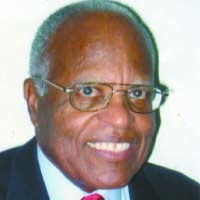media_artricles :: 2013
The Olympic Games selection site and doping
Basil Ince :: Trinidad Express :: 18.09.2013A WEEK ago Tokyo was selected as the site for the Olympic Games in 2020. The publicity, however, was not as widespread as when London was chosen for the Games in 2012.
Sebastian Coe (now Lord Coe) a former Olympic champion, spearheaded London’s bid in 2005. Tony Blair, then prime minister, committed the government to London’s bid, as did the former mayor of London, Ken Livingstone. Soccer star, David Beckham was part of the delegation which travelled to Singapore for the final choice.
London’s triumph marked the third occasion the games were held there. Previous occasions were 1908 and 1948. What made London’s memorable, was not an integral part of the bidding operation. Less than 24 hours after the choice, terrorists unleashed an attack on the London transit system killing 52 people and injuring many more. More money had to be spent on security. Talk about joy comingled with sorrow!
Tokyo defeated Istanbul and Madrid to host the games for the second time. In 1964 that city had become the first in Asia to host the Olympics. It had been awarded the games in 1940 but they were cancelled because of World War II. Japan’s disappointment was conveyed in the words of a former president of the Japanese Red Cross: “It was a national crusade for Japan to host the Olympic Games. We were still suffering under a defeated enemy syndrome in the eyes of most of the world. Without the magic of the Olympic name we might not have gotten the investment we needed to rise as a world power. Our national prestige was tied to it…” When Japan eventually got the games in 1964 they were an instant success. An Olympic historian wrote that they were “…one of the best ever” and described them as “charming, lovely and efficient.”
These 1964 Games are historically important to Trinidad and Tobago because they were the first in which this country participated as an independent nation. Ed Roberts and Wendell Mottley brought home our first Olympic medals in track events (200m and 400m) while they were joined by Kent Bernard and Ed Skinner in the 1,600m relay to bring our total to three medals, a number only surpassed almost half a century later.
Economics and prestige were important in leading to Tokyo’s selection as the Olympic site in 1964. This year it is primarily economics. The Japanese economy had stagnated after the earthquake and tsunami in 2011, and is struggling to recover. Those disasters had set off multiple reactor meltdowns at the Fukushima nuclear plant.
The setbacks made the population leery about hosting the games. However, prime minister Shinto Abe saw the games as an economic boost for Japan ($30 billion) and the creation of 150,000 jobs. After Abe’s rosy economic assessment, 90 per cent of the population supported the bid. In Buenos Aires, the prime minister also addressed the issue of the crippled radioactive plant at Fukushima, 140 miles from Tokyo, to allay the fears of the International Olympic Committee.
On the question of doping, the newly-elected head of the IOC, Thomas Bach, immediately issued his zero tolerance policy. He promised to strengthen the World Anti Doping Agency (WADA). In this day of professionalism where athletes earn their living by competing in track and field, they have to become more proactive in monitoring which supplements they may ingest. They ought not to rely solely on their coaches and managers to keep them informed. WADA has a website with the prohibited substances with which they can familiarise themselves at least every fortnight. If unsure about any substance, they can explore the matter further.
The use of Performance Enhancement Drugs (PEDS) is fairly widespread—too much for the comfort of the sport. WADA commissioned a team of researchers in 2011 to study the prevalence of the use of drugs. The team found that 29 per cent of the athletes at the World Championships in 2011 used PEDS and 45 per cent at the Pan Arab Games also did. Nevertheless in 2010, less than two per cent examined by WADA labs were discovered.
Chemists dealing in prohibited substances are constantly finding new drugs and techniques to evade detection. Incredulously WADA, the organisation created to weed out drug cheats, refused to publish the study although the researchers were prepared to do so. WADA said the International Amateur Athletic Federation (IAAF) needed to review the study, and do blood tests to combine with the results of the study.
The thinking in some quarters is that the results of the study shocked WADA and the IAAF and its release would be harmful to the sport. Neither organisation comes out smelling roses in this situation. In the meantime our organisations involved in the solution of our drug issue should lower the decibel level in their discourse. It does little credit to public diplomacy.
• Basil Ince is the author of Black Meteors: The Caribbean in International Track and Field

Enlarge Image
Basil Ince

Close Window